A card drafting, engine building game has been my holy grail game. I’ve tried for years to find it, I’ve even tried to design it myself. Is this it? Let’s evaluate Res Arcana in this review.
When Res Arcana hit the scene last year, it perfectly fit the description. So, when it was announced, I was so excited, I bought it just as it came out, just based on the designer’s name and a short description I had read. A new engine building game by Tom Lehman, creator of all-time-classic best-in-class engine builder, Race for the Galaxy? What is not to get excited about here!
This is game with a variety of cards with different powers that synergize together to build something greater than the sum of its parts. A drafting game that gets richer and richer the more you play it, as you learn the combos, the ins-and-outs of the interactions with cards. The first time I played it, I was giddy with the possibilities of this game. I thought I had found my holy grail game.
But after a few plays, I realized that I was wrong about what this game is. This game isn’t what it markets itself as at all. Let’s start with the rules.
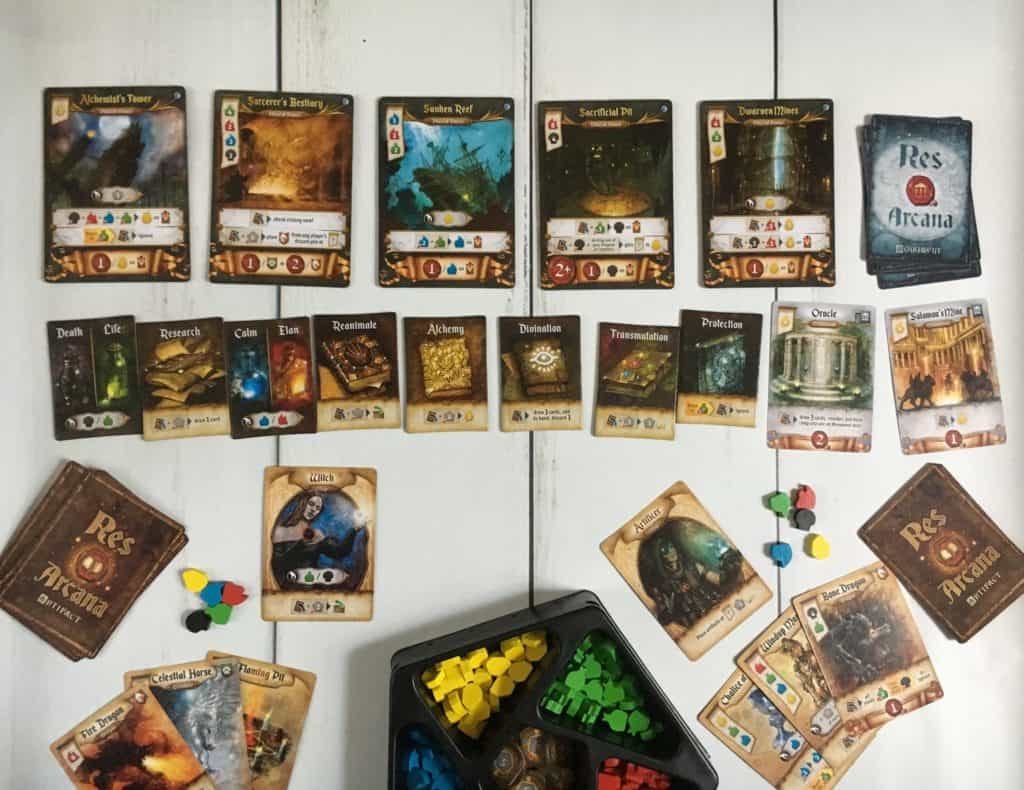
The Gameplay
Each player starts with a deck of 8 cards (called artifacts), which can optionally be drafted before the game begins. You also start with a Mage, which gives you a unique player power, some of which are powerful enough to be quite exciting (others which require certain cards or some luck to be good). And lastly, you get to start with 5 essences, the resource of the game. One of each color: gold, life (green), death (black), calm (I guess I get why calm is blue), and elan (you heard me).
(What do you mean you don’t know what color elan is? These resources couldn’t be any clearer. I elan, you elan. He, she, me elan. Elanology, the study of elan? It’s first grade thaumaturgical transmutation, Spongebob!) I wouldn’t have a problem with weird magical resource names for thematic effect, except let me just say to Mr. Lehmann, in order to create thematic effect, we must know what it is we’re imagining. And even after making a point to research Elan, it is as clear to me as a two way mirror caught in a thunderstorm.
Minor rant. Everyone just calls it fire anyways. Back to actual reviewing.
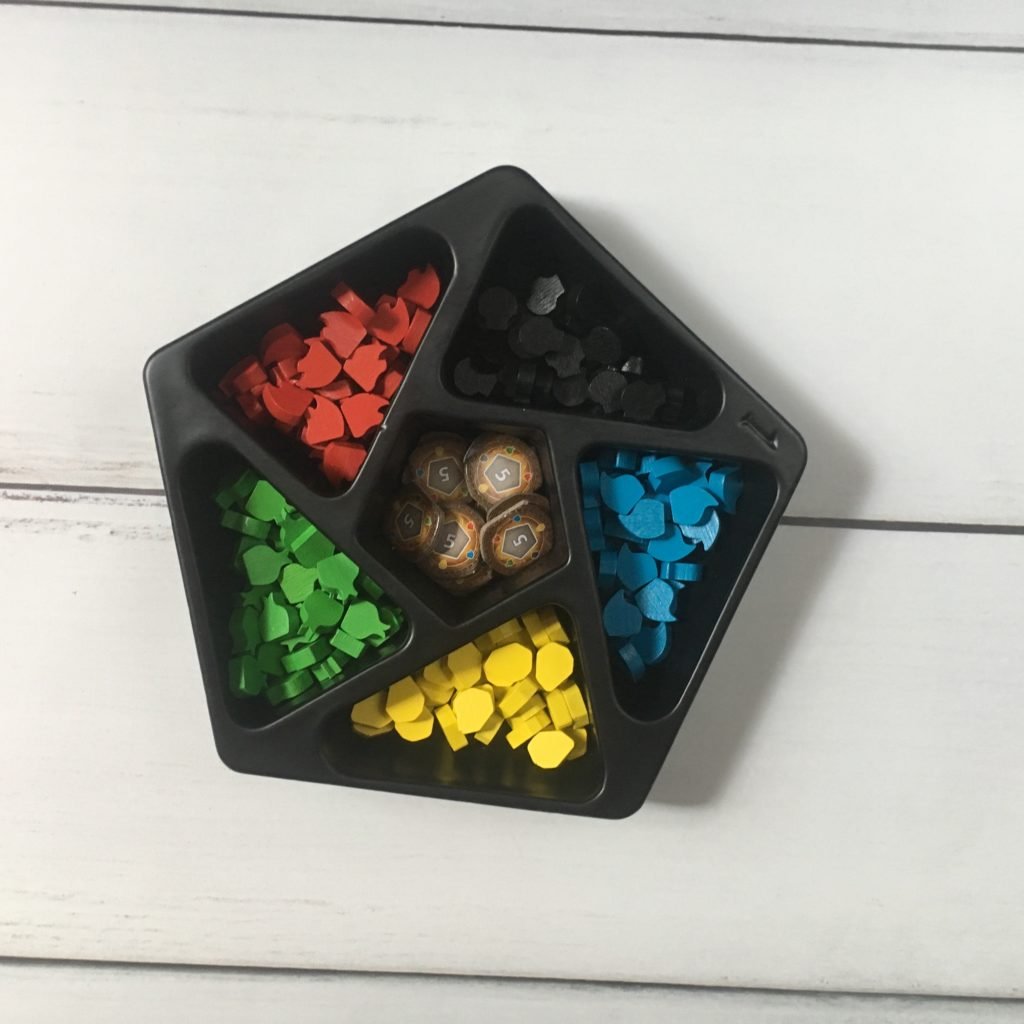
The game plays in rounds, where each turn of the round you can do only one action. Put a card into play, use the ability of a card, claim a place of power, etc. This means that each turn in a round goes by relatively quickly, and by the time you decide what you’re doing next, it will often already be your turn again. When a player runs out of things to do in that round, they pass, and the remaining players continue taking turns until they pass too. In practice, it seems like a clever way to make what could have been a very short game with very long turns into a longer game with very short turns.
On each turn, you get to choose to do one action:
- Place an artifact card from your hand into play
- Use the ability of one of the cards or pieces of cardboard in front of you
- Discard a card for 2 essences or 1 gold
- Claim a monument or place of power (these are the cards in the middle of the board that score points, the whole goal of the game)
Once a player reaches ten points, and they will always do that quicker than you’d think, the game ends at the end of that round. And whoever has the most points wins.
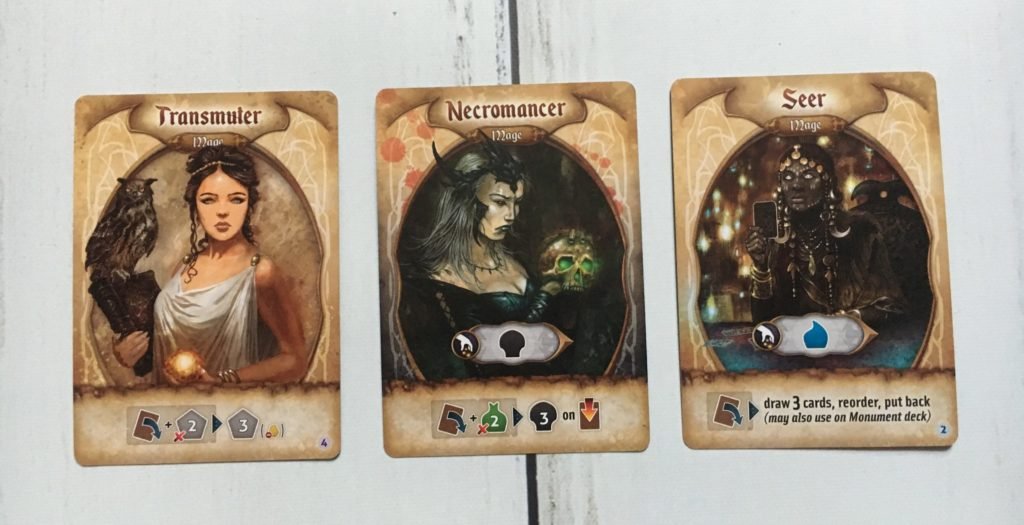
Res Arcana Commentary and Review
This game is not about building an engine. You already have an engine. You start quite rich, with 5 essences, and since you can discard cards in your hand for more essences, you essentially start with 11 essences. Even more sometimes, depending on the magic item and mage you’ve picked.
When people talk about engine builders, they think about games where you start off poor, and everything you have is due to good choices you’ve made, the cards you’ve built, and the engine you’ve got. Not so with Res Arcana. Many of the cards won’t even pay for the resources you spent on them by the time the game ends (even if you built it on the first turn of the game), and are never worth building.
Seriously, the coolest cards in the game are all underwhelming in actual gameplay. All the dragons are bad. Many of the essence producing cards are bad. There is honestly more bad cards than good in this game.
It’s often a winning strategy to never play a single card from your hand. Actually, playing zero artifact cards is going to be the best play pretty frequently.
Against experienced players, the game is going to end on turn 4 as often as it doesn’t, making almost every artifact not worth playing after the second turn. The most competitive players only build 1-3 artifacts each game, and even then, only on the first turn, and maybe the second. These artifacts are all marginal gains. It’s often a winning strategy to never play a single card from your hand. Actually, playing zero artifact cards is going to be the best play pretty frequently.
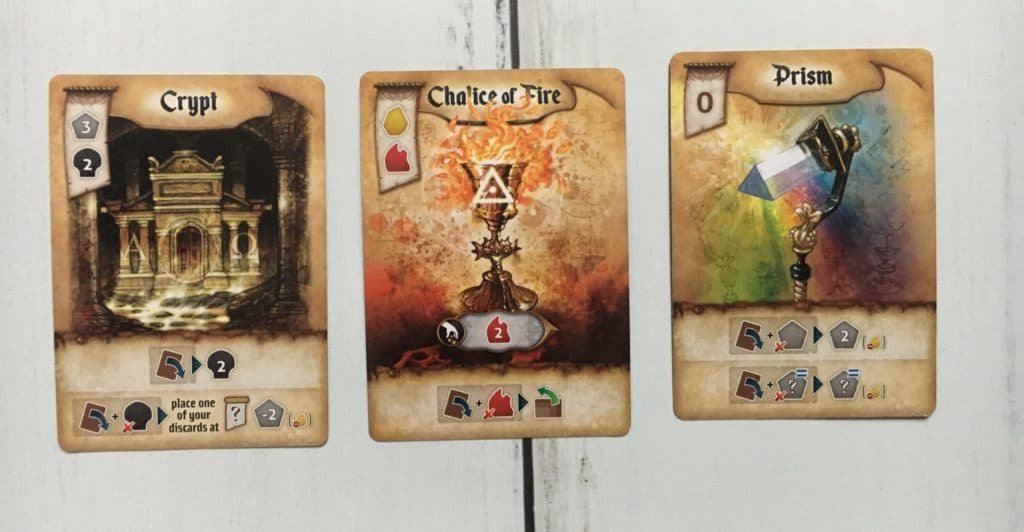
And let me clarify: it’s not that this game doesn’t include engaging engine building aspects to it. It does. It’s just that engaging in meaningful engine building is a loosing proposition in this game. The game does not reward it.
Because winning play and rewarding play are often different things, I should talk about the learning curve of this game. Initially, you’ll have the best games you can have of this game. You’ll be building something up, taking your time playing artifacts, collecting tons of essences every turn, etc. You might even play every artifact from your 8 card deck. But when you figure out the game, it speeds up dramatically, and for the worse.
It’s also not really a drafting game. Since so few of the artifacts matter in actual gameplay, your drafting decisions are to look for the powerful cards, and when that fails, it barely matters what else you take. Then during gameplay, you just have to hope those powerful cards are in the top 4 cards of your deck, so you can get it before turn 3, where nearly every artifact ceases to matter. But to the game’s defense, drafting is an optional variant. The designer probably realized he hadn’t made a drafting game.
This is one of the few games where I preferred not drafting once I got more experienced, and I adore drafting. Why? Drafting them felt like wasted effort. There are powerful cards that you’d draft highly, but you have to draw them early enough in the game for them to actually get you an advantage. And you’ll end up taking some terrible cards, but it didn’t matter much to me. Most of the cards will be discarded for two essences anyways.
So what is this game if it’s not about engine building and its not about drafting?
In the rulebook of the game, it warns that the game will end after 4-6 rounds, that skilled players will end the game after only 4. That being in the rulebook means it’s baked right into the premise of the game. The artifacts were balanced around the idea of a 4 turn game. Everything I’ve mentioned so far was designed knowingly by the designer. To what end though? Why not make engine building important in this game? Why make playing zero cards a good strategy?
Because it’s a race game about resource conversion, not an engine builder.
First, you’ve got to make the right essences to claim the right place of power, and find a way to score ten points as quickly as possible. In order to win the race, the goal is to drag out your rounds as long as possible, so you can make more essences, have more productive turns, and ultimately, win the race.
Instead of making an engine that practically hums along without your input, you’re doing whatever you can to edge yourself as far along as you can. You’ll discard any card for essences if it isn’t immediately useful, you’ll destroy your own artifacts, you’ll scrap it together with duct tape and makeshift parts. It won’t feel pretty, and unlike other engine builders, you probably won’t feel prideful of what you’ve built (especially once you start getting good at the game).
Yet, despite the game not being what I thought it was, it’s still excellent. Even though you never quite feel proud of your engine, you will feel proud of how quickly you scored your ten points.
The turns are face-paced and tense, and it still has tons of choices to let you feel like you’re doing clever. You need to find a way to make just the right essences at just the right time, and when you do, you feel super powerful. The game gives you a lot of tools to do that, and it all comes down to having a plan.
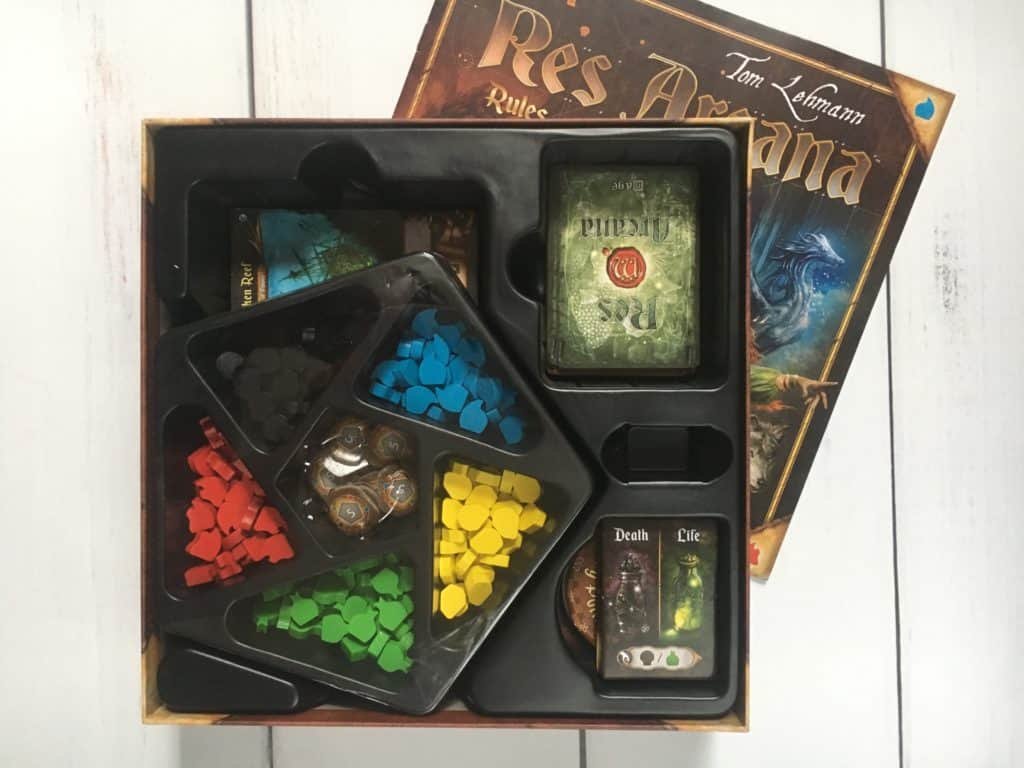
There is a ton to like here. Unlike a game like Race for the Galaxy, this game is super smooth to learn and play. The icons are clean and clear, and teaching it isn’t something I dread, though the game of course has its quirks to teach. There are a few clarifications you will almost always have to make a few times throughout the game, but all in all, it’s a relatively smooth game.
The game also has stellar art, and pretty great design.
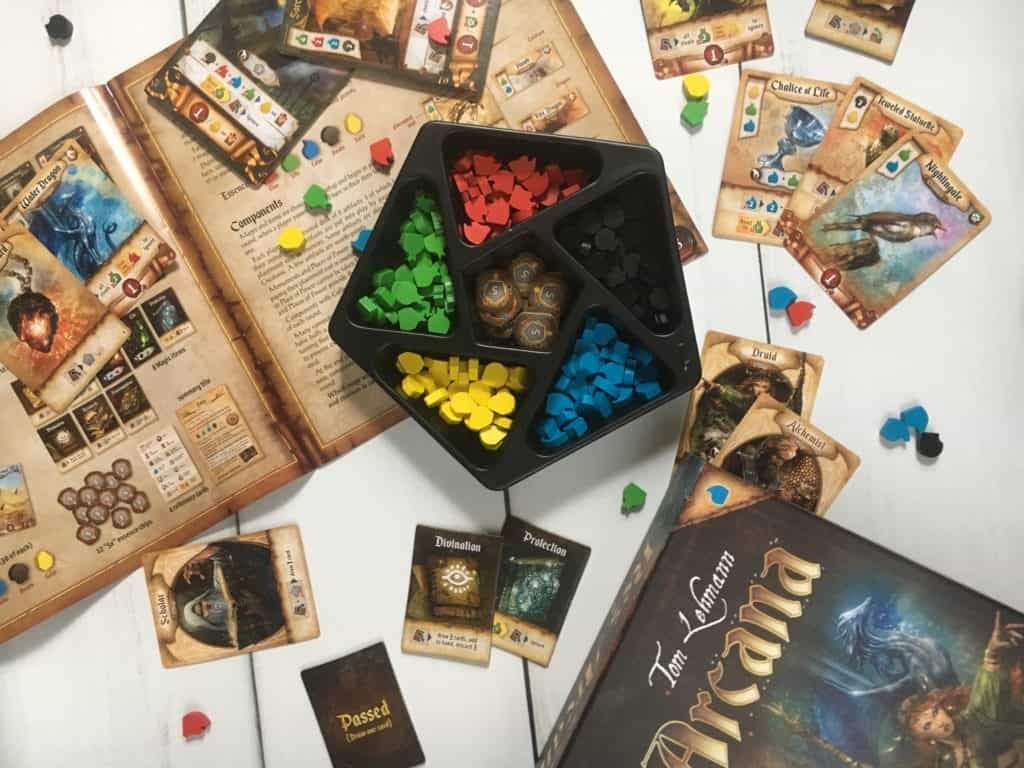
Res Arcana is a game for planners. This game is absurdly front-loaded as is, meaning you’ll have to have a plan for most of your game on your first turn. Drafting only makes it even more front-loaded. You have a very small deck, and you know what every card is, you know what synergies and combos you might be able to assemble. The rest of the game is simply assembling them, which don’t get me wrong: it’s still is full of interesting choices, can be disrupted by opponents, and always feels urgent.
And honestly, even a year later, this game still hits my table pretty frequently. I’ve even been keeping my eye out for the impossible to get expansion, Lux Et Tenebrae.
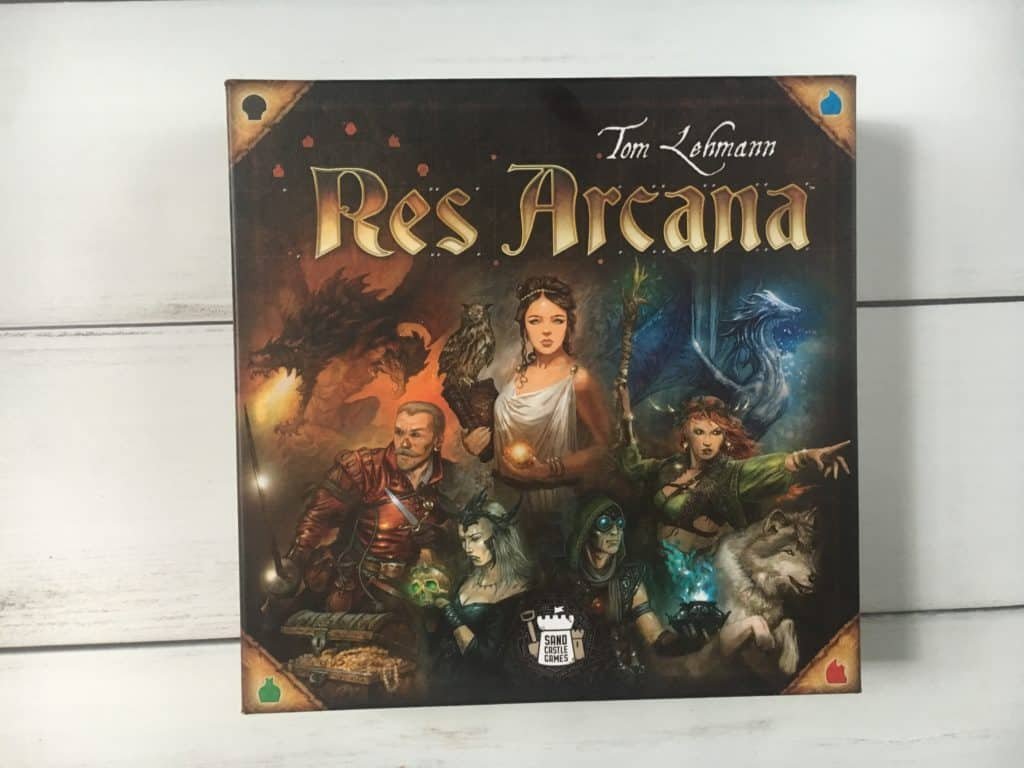
One of the main principals I’ve held myself to for this blog is to review a game only once I feel that I have a strong understanding of its mechanics and its strategy. So while a game might present itself one way when you first start playing, some games transform into something far different than that. And this is one of the games where I know I’m putting out a review quite different than what other reviewers have, and I can’t help but think its because I waited a year to put out my review of Res Arcana.
I hope it was worth the wait.
Boom. Res Arcana Review, complete. Thanks for reading.



The best review I have read so far on this game. Someone said: “it is a weird little animal with a strange face, and after a couple of plays it turns out you were looking at its backside.”